A round-up of some Parsi specialty stores in the festive week of Navroze and Khordad Sal
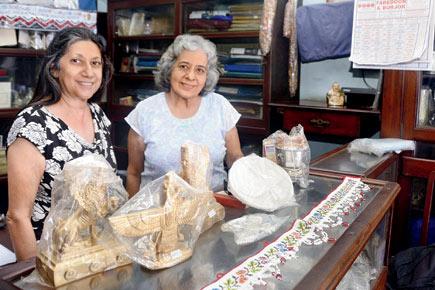
Soonoo Netarwala
 Why are the clocks in Mumbai fire temples set 38 minutes slower than standard time?
Why are the clocks in Mumbai fire temples set 38 minutes slower than standard time?
ADVERTISEMENT
Where can you find the only cobbler who still makes traditional sapaat slippers?
Would Khordad Sal, the birthday of Zarathushtra, be the community’s Christmas?
The answers to these quaint questions lie within the walls of small shops, which have been standing for as long as 150 years in our narrowest gullies, catering to 40,000 members of this fistful of a community left in the city. Their range of religious and cultural bric-a-brac is used daily as well as on auspicious occasions by followers of the world’s first monotheistic faith.
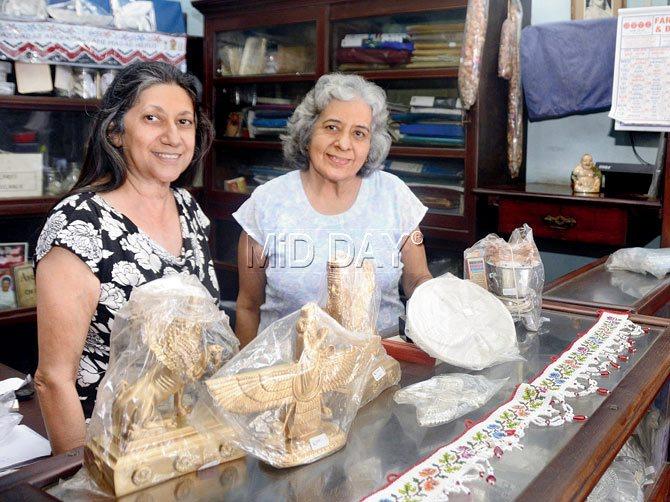
Soonoo Netarwala and Soonu Vaid at the Faredoon & Burjor counter, display a bead door toran and statues of the holy Farohar emblem and Assyrian horses
Moolla ni Kapad ni Dukaan, as it was originally advertised, is where proprietor Noshir Moolla of ND Moolla & Sons sits behind clouded glass counters under a crankily whirring fan. His generations-old shop on Princess Street abuts Wadiaji Atash Behram (an Atash Behram — Fire of Victory — holds the highest grade of fire among agiaries). Worshippers buy sukhad (sandalwood) sticks at a French window of the store which overlooks a lovely sculpted fountain fronting the Atash Behram. Opening its doors in 1893, Moolla has every conceivable item Zoroastrians could need for rites from birth to death, including shiav, or funerary garments. Moolla’s father Darabshaw worked from a tender age 8 to a ripe 80 at the family firm established by his grandfather Nusserwanji at this spot occupied by the Katrak Hosiery Works factory till the Depression. “We imported mulmul (muslin) and long-cloth from John Peele, so the Congress picketed us in the Quit India movement,” Moolla says. They then ordered bales available from Bombay and Ahmedabad textile mills.
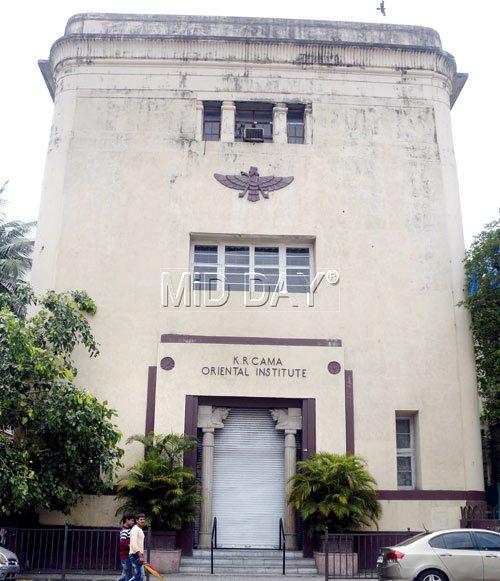
KR Cama Oriental Institute, celebrating its centenary year, houses the Zoroastrian Studies shop on the ground floor
Moolla offers 25 sizes and 40 varieties of the white mulmul sadrah vest Parsis wear with the sacred thread kusti girdled around it, at their Navjote thread ceremony. “No other shop has even half as much,” he claims. Seeing me admire two dozen antique clocks, solemnly lined up for repair, he adds that horology is a hobby and has a pocket watch collection too. Swathes of red satin fabric from Mangaldas Market, for prayer caps, thump down where I scribble notes. A gent visiting from Toronto — second largest hub of the Parsis after Mumbai — asks, “You from Parsiana?” He refers to the community’s most progressive magazine. I smile my nay.
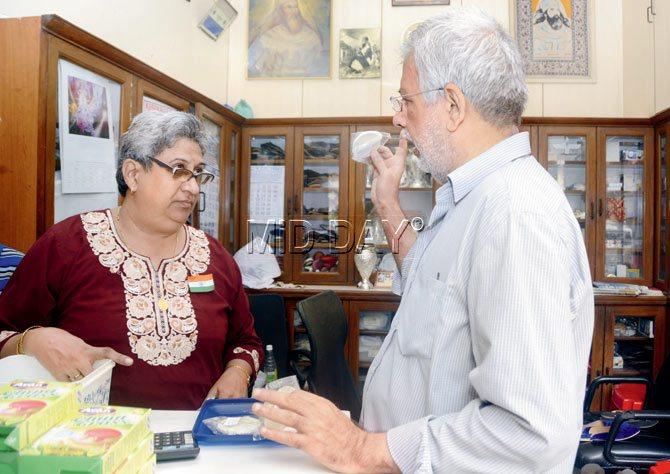
Tanaz Kerawalla, fifth generation proprietor of RN Kerawalla & Co, attends to a customer
A century-old bastion resting a slant across the street is Faredoon & Burjor, founded by Faredoonji Parbhoo and his friend Burjor. Faredoonji was a railway employee of modest means before he ventured into the sandalwood business. He designed the first Parsi calendar, and old faithfuls yet insist on a Faredoon & Burjor calendar despite others in the market today. Faredoonji’s granddaughters Soonu Vaid and Soonoo Netarwala keep alive his legacy. Their shelves are stacked with Malabari and African sandalwood, wood shavings (tachho), Gujarati and Roman script copies of the holy Khordeh Avesta, sadrahs, kustis, broad linen belts called pichhoris, Persian rugs, vases, festive trays (ses), pendants and nightlights emblazoned with unique Persian motifs. This shop, in 1926-built Cooper Building, has an interesting neighbour — Lord Irwin Restaurant and Bar — whose name has nothing to do with Viceroy Irwin, declare its Irani owners of 80 years.
A hop away, tucked into the winding Dickensian lane behind Parsi Dairy Farm, dubbed Dukkar Gully for rowed pork shops, is RN Kerawalla & Co. It sells hand-stitched nine-joint sadrahs, kustis and an array of unusual artefacts such as metal-embossed plaques of Mount Damavand in Persepolis before which thanksgiving jashans were held. When Rustomji Nusserwanji Kerawalla set up shop in 1887, he manufactured special caliper shoes for polio patients. Kerawalla’s is now the only place in town that stocks sapaat — close-toed slippers worn by children at their Navjote thread ceremony and priests performing rituals. A neighbour, Gool Bharda, recalls groups of chattering mochis craft sapaat pairs up in the shop loft in earlier years. One lone cobbler in a faraway Ambarnath workshop hammers these out today, in maroon velvet and black leather.
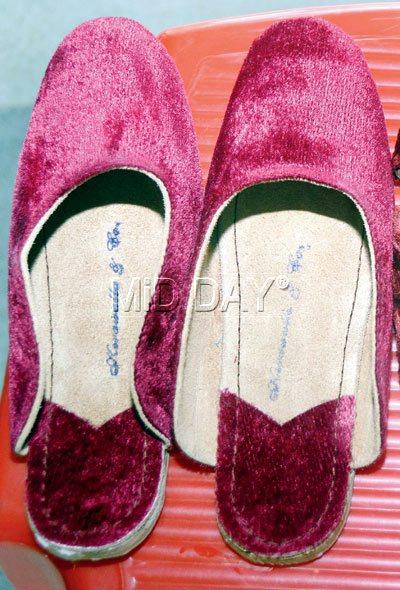
A pair of traditional maroon velvet sapaat slippers exclusively stocked at this shop. Pics/Sneha Kharabe
Celebrating her epicurean community’s passion for good food, Rustomji’s fifth-generation daughter-in-law Tanaz Kerawalla offers tangy Kolahji pickles and vinegars from Navsari, sweet bhakra buns, cutlets and kebabs, or “cutless kavaab” in Bawa parlance! Trailing into her Princess Street shop from his Queens Road home round the corner, city historian Deepak Rao’s grandson knows Kerawalla as “Momo Aunty” — after a Nepalese cook taught her chefs this north-eastern treat.
Further up from Dhobi Talao is Zoroastrian Studies at Ballard Estate. This treasure trove is housed in the KR Cama Institute, which marks a century this year, created in 1916 to promote the study of cultures of the East. Zoroastrian Studies was co-founded by Khojeste Mistree and Shehrnaz Panthaky in the 1980s, with handpicked religious icons, publications and CDs explaining theology. The leitmotif of the Farohar, the ancient Avestan Fravashi guardian angel, is engraved on artefacts, greeting cards and Iranian wall hangings. Piled beside prayer tomes with meaningful translations are surprise lighter editions like cookbooks and the humorous phrasebook Parsi Bol.
Crisscrossing back a bit brings me to what must be the oldest specialty shop, Edulji Rustomji Sukhadwala on Thakurdwar Road facing the Charni Road rail tracks. More than 150 years ago this was a tin shed selling sandalwood in the Banaji Atash Behram compound, still its location.
Edulji was the great-grandfather of Rohinton Contractor who has attended, since 1988, to customers choosing from fine tapestries, embroidered scarves, decorative plates, oil lamp (divo) covers, floating lights and glass bead door torans. Situated near both Chandanwadi and a kabristan burial ground, Edulji Sukhadwala’s sandalwood, in blocks and powder form, is sought by a stream of Hindus and Muslims alike.
The shop is in Albless Building, after the benefactor family of Edalji Faramji Albless who also lent this last name to the wedding venue Albless Baug. A charmingly earned name... owing, we are told, to Edalji’s kind greeting to everyone he met: “God bless you all.”
Author-publisher Meher Marfatia writes fortnightly on everything that makes her love Mumbai and adore Bombay. You can reach her at mehermarfatia@gmail.com
 Subscribe today by clicking the link and stay updated with the latest news!" Click here!
Subscribe today by clicking the link and stay updated with the latest news!" Click here!






